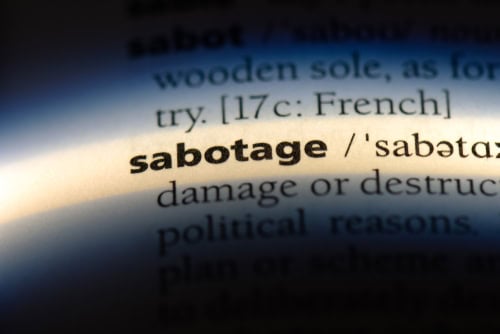Go ahead, say it … being a lawyer sucks!
Updated 7/6/2024
You might have arrived here after googling a term like "I hate being a lawyer," "recovering lawyer," "being a lawyer sucks," or "why did I get a law degree," or some other similar search. Rest assured, you're not alone: Most attorneys are unhappy with their law practice, hate working at their law firms or are desperate for a new job or career.
We understand. We've been through exactly what you're going through right now, suffering physically and emotionally. That's why we created Leave Law Behind, and we'd love it if you considered LeaveLawBehind.com a safe space for you.
The first time I realized that being a lawyer is miserable, it hit me (Casey) very hard.
It was right after I left the office after a particularly stressful legal workday. I had suffered through a long software licensing negotiation that left me drained. I was stressed that I had so much more work to do and anxious that I might have missed or overlooked some vital indemnification and liability details.
The opposing counsel just wanted to fight when I tried to resolve things. The client insisted on using their agreement version, so I was redlining a Word doc I wasn't initially familiar with. I was on a tight deadline because all parties wanted this deal closed before quarter-end.
And I had another long day (and night) of the same type of lawyer work ahead of me.
As I walked home, a visceral feeling of shame, disappointment, and fear overcame me. The searing heat penetrated the whole of my body like an electric current. I've never been struck by a 30 million-volt lightning bolt, but I assumed it felt something like this. It hurt all over my body.
But the feeling also was a relief. I felt shame, but I had no doubt. The sense I had buried deep inside of me was genuine.
I said to myself, "I hate being a lawyer. I hate practicing law."
I knew then I needed to find or create a new career for myself. I knew I needed to find a new job to salvage my future life. The business of law was not for me.
If you also are an unhappy lawyer, regret going to law school, regret starting your own firm, or feel being a lawyer sucks, we understand. In this article, we'll help you unpack the core reason why you hate being an attorney (which we think will surprise you) and learn what steps you can take to explore an alternative career out of the law. There is hope. 🙂
Let's dive in!
The real, hidden reason why being a lawyer is miserable
Before you can move forward and become happy professionally, you need to first engage in authentic self-reflection and uncover the core reason for your current unhappiness as a lawyer. It can hurt some, but you need to uncover why you hate being a lawyer.
When a new member joins our Leave Law Behind course, before we discuss the first step to making a major change and what a better job is for them, we often will ask them what it was about being a lawyer they did not like. We have them list the terrible things they've had to endure. They come back with many reasons, but most issues fall within the realm of what we call the "Usual Suspects":
- You do not mesh well or trust your fellow associates or lawyer co-workers at your law firm.
- You do not feel the senior partners appreciate you.
- You feel there is no clear or exciting career progress in the legal profession for you.
- You cannot deal with the constant deadlines and needy clients.
- You feel you work crazy hours and have no work-life balance outside.
- You are sick of always being "on" 24/7 to please the boss.
- You aren't making as much money as a lawyer as you thought.
- You're tired of dealing with other people's problems each day.
- You wish you could connect with people and not be stuck in front of a Word doc all day in the firm's office or your home office.
- You are sick of the business's adversarial nature. You want to stop all the fighting and free yourself from constant client litigation.
- You are constantly stressed out.
- You went to law school to please your parents.
And you could list out many more.
These grievances are understandable and regularly pain and torment many unhappy lawyers. However, none of these are the core reasons you hate being a lawyer.
Let us explain. The main fundamental reason you hate being an attorney is because you don't like the work you do all day. There is no creativity, no use of your fundamental skills and strengths. In other words, you were never meant to be a lawyer. You don't like your legal work.
Many unhappy attorneys who come to Leave Law Behind and seek help to leave their law practice and to transition out of the legal industry to other jobs do so because they detest the daily grind and the nature of the work itself.
Unlike the dramatized portrayals of lawyering seen on television and in movies, the day-to-day reality for many lawyers involves a significant amount of routine and often tedious tasks. Document review, drafting motions, writing briefs, taking client calls, conducting legal research, and preparing for depositions can become monotonous and unfulfilling over time. The work is often detail-oriented and requires a high level of precision and meticulousness, which can be draining and lead to burnout.
But remember, through all of this, it's still the lawyer work you don't like.
We know this may seem surprising. Or too simple. You may have trouble accepting that being an attorney is not what you're meant to do. You may not want to believe this. You may want to avoid admitting going to law school was a mistake. You may feel it couldn't be that clear-cut. You may think you like the work or are cut out for the job.
But it is. You're thinking to yourself "I hate being an attorney" is caused in large part by your lack of connection to, alignment with, or skill set for the work a lawyer is required to do.
For example, one Leave Law Behind coaching course member said that being a litigator was not a fit with him at all. He wrote, "I was on a Zoom conference with my office last Friday and my boss told us that we needed to fight over a certain thing. He said having something to fight would be great for our morale, and everyone seemed to cheer. Inside, I thought, 'I don't want to fight, I don't like to fight, I want to resolve.' I felt like such an outsider."
Another Leave Law Behind member recounted for us how she felt she was facing stress from numerous sources at her job—the billable hours, the need for perfection, the people she dealt with, and her feeling of loss of control, but through it all, she just didn't want to do the work.
To dive in deeper:
- Billable hours: She felt the job hours were "terrible." The irony was that as much as she disliked working that much, she also echoed what so many lawyers hate, which is having little to no billable hours at all from clients! She remembered how her practice group was in a lull, and she hated struggling to bill even 100 hours a month, and that is making her as anxious as, or even more anxious than, billing 200 a month.
- Perfectionism: She also couldn't stand the constant need for perfection. She worked hard and always made sure her work product was excellent. But, inevitably, she knew she was bound to make mistakes here and there. And it's those mistakes that clients and other people in her law practice always point out, make a big deal of, and seem to remember. It doesn't matter that she did her job perfectly 99.9% of the time.
- Clients and Fellow Lawyers: This Leave Law Behind member also disliked the hostile personalities so prevalent in this profession. Most people at her firm get stressed and take it out on others, usually those below them.
- Her Future Self: She also remarked that she looked at the people at the partner level in her and other law firms and did not see a single person whose life she would like to have. Most lawyers, if not all, seemed miserable. She did the self-reflection to realize that she wanted to move forward and have a happy life.
- Money: Even though she hated her law practice and wanted a different job, she constantly worried that she'd get fired, which led her to be anxious that she wouldn't be able to find a job that paid a decent salary and allowed her to make the money she needed to continue to pay her student loans.
- The Work: And finally, this Leave Law Behind member also disliked the fact that she had no control over her life. The legal work she was tasked with performing - which she found boring, uncreative, and lacking any purpose - tended to dictate her schedule and, by extension, her life. The thing she hated the most held dominance over her.
The good news for her is she is on her path out of the law with the Leave Law Behind coaching program!
What you are truly good at and want to do all day is much better suited and will be more appreciated in any number of different jobs and career paths that have nothing to do with the law!
Ready to Take Back Control of Your Life from the Law? Click here to visit our home page and gain free access to our Resource Library, a life-changing collection of videos, tips, and inspirations specifically designed to help you explore and consider your path out of the law. All for free!
There is hope: What you can do now to become a "recovering lawyer"
As a result, some lawyers may question their career choices, longing for roles and career paths that free them from the law firm, align more closely with their aspirations for excitement and meaningful contribution and pay them a meaningful salary to assuage their money worries.
Even if being a lawyer isn't your true calling, we assure you that there's an 'alternative' career waiting for you. A career that you can enjoy, earn a good income, and most importantly, add value to others. You don't have to be stuck in a career you dislike forever.
To help you, here is some information to assist you on the first step out of the law:
1. Understand what you are good at
At Leave Law Behind, while we want to help free you from a miserable job, we do not want you to leave an attorney job you don't like for a career out of the law that you also don't fit in well with. That would make no sense.
In Module 4 of our online coaching and training course, as a first step, we walk you through discovering what we call your "Unique Genius." These are the skills and strengths you have that come naturally to you and are called for by alternative careers. When you use your natural talents in a job, it's much easier to love that job and add value.
This is so important for you as an attorney. You likely took the attorney job you have now, NOT because it entirely fits your skills and strengths, but rather because you focused on finding a job based on finances, security, and social acceptance.
Let's delve deeper into this process: The Leave Law Behind program is designed to empower attorneys like you to find fulfilling non-law jobs. It all starts with a journey of self-reflection, where you're encouraged to look inward and recognize your core strengths and passions. By understanding what you're truly good at, you can tap into your authentic superpowers. The program's framework helps you uncover the talents and abilities that set you apart, making you uniquely qualified for specific jobs outside of the legal field.
But don't just take our word for it. Tyler Hinz, a Leave Law Behind graduate, shared his success story. The program helped him realize that his skills weren't limited to the legal field. They were broad and appealing enough for a new career with non-law employers. He received several interviews for jobs that required extensive business experience, a field he had never worked in. Yet, he felt confident in his abilities, and they took him seriously in the interview. Eventually, he secured a non-law job that he was very excited about: he left his solo law practice and became the Director of Trusts, Estates, and Stewardship at the University of California, Santa Cruz. Since then, he's been promoted and was recruited to become the Executive Director of Planned Giving at Santa Clara University. Tyler's story is a testament to the possibilities that await you. Read more about Tyler here: https://leavelawbehind.com/stories-tyler/.
2. What kinds of jobs would you really like or LOVE?
At this point, you may have doubts about whether you can make a mid-course correction in your career. You may wonder if you’re qualified enough to land one of these alternative careers. You may wonder if there are any job postings out there that fit your skills.
The short answer is “you can,” “you are,” and “there are.” You have what we call the “transferable skills” in demand by alternative careers. All you do as an attorney (listen well, write clearly, present persuasively, be the adult-in-the-room, upsell clients, present to relevant stakeholders) is needed and called for in jobs outside the law.
We know this because we’ve helped hundreds of unhappy, unfulfilled attorneys like you leave the law for alternative careers.
Our program is designed to help you identify your Unique Genius skills and strengths. Once these are isolated, we assist you in aligning them with potential job opportunities. This involves matching the value you bring to the table with the requirements of various non-lawyer job descriptions. Our team meticulously analyzes job listings to find roles that not only fit your skill set but also promise satisfaction and growth. This ensures that your career transition is not just a lateral move, but a step towards a job that resonates with your Unique Genius skills and strengths.
One Leave Law Behind grad’s main interests were what she called “herding cats.” After some self-reflection, we surfaced that she liked to be tasked with clarifying ambiguous situations and loved working long hours if she saw meaning in her work. She liked aligning a team of people around a common purpose, helping them set aside their personal goals for the team goal, and project managing to collaborate to achieve a mission for the business greater than the sum of the parts. As we worked together on these strengths, we realized that the job area of “compliance” and “change management” was a perfect fit for her. She is now the Head of Compliance and Change Management for a Florida county clerk and comptroller’s office! And she loves her new non-law job and doesn’t deal with lawyers anymore!
This comprehensive approach ensures that you do not end up in another unsatisfying role. Instead, you are directed towards positions where you can excel and feel genuinely fulfilled. The process of identifying your Unique Genius helps you understand your true potential and how it can be applied outside the legal industry. This self-awareness, combined with the program’s strategic matching of skills to job requirements, results in a career path that is both rewarding and sustainable. By focusing on what you are inherently good at and passionate about, the Leave Law Behind program helps you find the right non-law job, paving the way for a successful and satisfying career transition.
3. Craft your "alternative" job resume and cover letter
You know how to put together a resume to apply to lawyer job postings. But creating a resume for a job out of the law is a different animal. Casey is a contributing writer for Above the Law, and he has written about non-law job resumes in-depth in his article Three Things To Keep In Mind As We Reposition Our Legal Resume To Get A Non-Law Job.
We have done the heavy lifting for you in the Leave Law Behind coaching course. Out of all the non-law jobs we've identified, we've highlighted the top 21 "alternative" roles and created resumes for each one. These resumes are downloadable, easy-to-customize, in plain English Word docs for you to use immediately.
Deb, one of our course graduates, used Leave Law Behind to transition from unhappy lawyer to a technology marketing executive. She's a testament to the instant results our resumes can bring. Before joining our course, Deb sent out over 30 resumes for non-law jobs, with no call backs. Once she used our templates, she received call backs instantly and landed a technology marketing executive role in Seattle that perfectly aligns with her interests. Learn more about her story in the below video.
Our program is designed to help you seamlessly transition into new non-law careers by emphasizing the transferable skills and experiences you bring to the table. One of the standout features of the program is its resume crafting service. The Leave Law Behind team assists in creating a resume that details your legal background and highlights the benefits and impact of your experience through what we call "resulting in" language. This approach ensures that your resume lists your responsibilities and showcases the positive outcomes and value you can provide to a potential employer. For example, instead of merely stating that you "managed a team of associate attorneys," the resume would include a phrase like "managed a team of attorneys, resulting in a 30% increase in efficiency and a significant reduction in case processing time." This method helps translate legal skills and your law school experience into universally understood benefits, clarifying how your experience can be advantageous in a non-lawyer job.
4. Why you should be worried about hiring managers and their questions about you leaving the law
One of the most prominent fears most lawyers looking to leave the law have is the impending interview they'll have with the hiring manager of a company. You may think they'll reject you or think you're crazy for leaving the law. You may fear they'll ask you many tough questions you feel you can't answer, or they'll just be mean.
Nothing is further from the truth. When Leave Law Behind grads do meet hiring managers for interviews for "alternative" jobs, they are so prepared, so aligned with their Unique Genius narrative, and present so well that they often wonder what they were ever afraid of in the first place. The Leave Law Behind program is designed to help attorneys transition smoothly into non-legal careers by highlighting their transferable skills.
One of the key features is role-playing sessions that simulate real hiring interviews. These sessions allow you to practice answering common interview questions and receive constructive feedback on your performance directly from our coaches. Through this process, you gain confidence and learn how to effectively communicate your strengths and experiences in a way that resonates with hiring managers. The Leave Law Behind program also focuses on identifying and articulating your valuable skills as a lawyer, such as critical thinking, problem-solving, negotiation, and attention to detail, which are highly sought after in various industries. By emphasizing these transferable skills, you can clearly demonstrate your potential to excel in non-legal roles - we want you to "have them at hello!" This process of self-discovery and effective communication empowers you and puts you in control of your career transition.
One Leave Law Behind member who left the law for a non-law job as a compliance manager at a nationally recognized bank remarked how well prepared he was for his interviews, he was even over prepared - he had answers to questions that weren't even asked! This sense of being ahead of the game and the pride that comes from such thorough preparation is a testament to the success of the Leave Law Behind program.
Ready to Take Back Control of Your Life from the Law? Click here to visit our home page and gain free access to our Resource Library, a life changing collection of videos, tips and inspirations specifically designed to help you explore and consider your path out of the law. All for free!
Being a lawyer sucks … so don't sabotage yourself as you try to get out of the law
We've explained the core, fundamental reason why you hate being a lawyer. We've also laid out the steps you can take right now to explore your path out of the law.
There is one more essential step we'd like to highlight for you. And that is, watch out for the self-sabotage. You may nod your head at all we've discussed in this article. But regardless of how much you agree with the idea of leaving the law, the main obstacle standing in your way of happiness remains … yourself.
Self-sabotage is a significant barrier that can prevent unhappy lawyers from making a career shift and leaving the legal industry. Self-sabotage occurs when you unknowingly, unwittingly, or subconsciously get in the way of your grand plans to make a positive change in your life. This can manifest itself as doubting you're capable of making this type of transformation. It can appear as fear, settling, or anxiety. It can surface as endless procrastination and inability to get some of the required done.
Despite the regret of going to law school and the dissatisfaction with your current lawyer job, the fear of the unknown often holds you back. Lawyers like yourself may doubt your ability to succeed in a different field, questioning whether your skills are transferable or if you can match the success you've achieved in law. You might worry about financial stability, potential failure, or how a career change could impact your personal and professional identity. You worry you'll also have to suffer through long hours in any non-law job. This apprehension can lead to a cycle of inaction, where the comfort of the known, even if it's unsatisfying, feels safer to you than the uncertainty of a new path.
Additionally, the legal profession's (apparent) prestige and societal expectations can reinforce this fear, making it harder for you to take the leap. Ultimately, this self-sabotage traps lawyers like yourself in attorney roles that drain your passion and well-being, preventing you from exploring fulfilling opportunities beyond the law firm. Recognizing these self-sabotaging behaviors and addressing the underlying fears is crucial for you in breaking free and pursuing a more rewarding career.
The main reason you'll procrastinate in leaving the law is because you don't have an idea of where to start. You feel you don't have a map, GPS, or outline. You have a knowledge gap.
Leave Law Behind closes that gap for you.
To summarize, here's how you can go from saying, "I hate being a lawyer," to "I love my new job out of the law":
- First, admit you do not like what you do day in and day out as a lawyer. Considering all you've put into becoming a lawyer, this objective look may be hard to swallow, but the facts are the facts.
- Next, understand that you do not know what to do next.
Guess what? We do! Sign up for some free training and discover your next steps to happiness!
As the coach and motivational speaker Paul F. Davis counsels, "If you don't feel it, flee from it. Go where you are celebrated, not merely tolerated."
We also have written other articles and resources that can help you on your path out of the law. Four of our most popular and helpful are:










